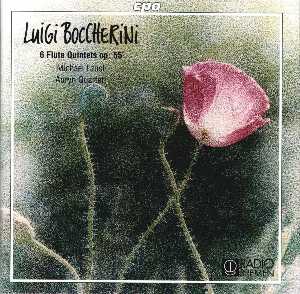Luigi BOCCHERINI (1743 - 1805)
Flute Quintets Op.55
58'34"
 Michael Faust (flute) Auryn
Quartet
Michael Faust (flute) Auryn
Quartet
 Recorded February 12 -15 1996
Sendesaal. Germany. DDD cpo 999 382-2
Recorded February 12 -15 1996
Sendesaal. Germany. DDD cpo 999 382-2

The six Quintets for Flute and String Quartet on this CPO disc were written
around 1797. Probably economic needs as much as artistic imperatives prompted
their writing. The Italian composer was living in Madrid and using a Paris
publisher to feed his public a prolific but repetitious diet of the chamber
music scores his mainly middle class customers had wanted. As they became
less in demand he continued to write but not publish and struggled to make
a living. One of his richer Royal patrons died and Boccherini found that
isolation and a lack of challenge had caused his work to stagnate stylistically.
He died in poverty a few years later. There is a suggestion that the Quintets
were written hoping that they would provide contact with titled patrons in
Madrid through a noted oboist friend of Boccherini's who had entrée
to these circles.
The Quintets were specifically written for either Flute or Oboe - a not uncommon
practice at the time. Many purchasers of the published scores of the time
were amateur performers and an option such as that would presumably increase
the potential market for a piece of work.
There is an inevitable sameness - which is not the same thing as monotony
- about the works, due mainly, I believe, to the limited dynamic range heard.
The flute, because of its very nature, cannot dominate the sound in a small
ensemble so even though the flute is busy throughout and one is always aware
of its presence, there is never the feeling of a "flute plus strings". There
is nothing very fast, nothing very slow and no memorable melodies emerge.
As an established String Quartet one expects the Auryn to blend together
well and the balance of the ensemble with the extra instrument and the way
the engineers have captured it, without resorting to "close-ups" is first
- rate. Michael Faust, the German flautist, has a lovely warm tone and his
phrasing and breath control are exemplary.
No doubt few potential buyers would play the six works one after the other
but rather dip into them as the need calls.
They will find undemanding, attractive music, easy on the ear, impeccably
played and well recorded. The earth will not move while you listen but the
time will pass pleasantly.
Reviewer
Harry Downey

